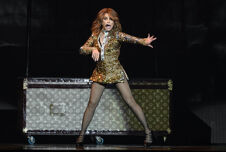In the hours following the Orlando Pulse shooting, I realized how difficult it is to be an LGBT ally. Difficult, because I didn’t know what to do.
Difficult, because this isn’t my tragedy. I can’t claim ownership or pretend to know how it feels to be singled out for my self-identity.
My heart is broken for the victims and families, but I don’t know what to say, and I don’t know who to say it to. I can only stand nearby, and put my hand on someone’s shoulder as they cry, and say “I’m sorry.”
It’s difficult, because my nature is to be a caretaker. I like to help people. I like to teach. I’m a father of three, and my dad instincts kick in when there’s a problem. But I can’t do that here. My role is that of a supporter, not a fixer.
Never Miss a Beat
Subscribe to our newsletter to stay ahead of the latest LGBTQ+ political news and insights.
When white people come to the aid of African-Americans after a shooting, they’re often featured in news footage and photos, as if to say, “See, even white people care.” When Coptic Christians in Egypt held hands and surrounded a mosque to protect the faithful while they prayed, and the Muslims did the same in return, news stories around the world told of their cooperation and protection.
But as allies, we’re not the story. This wasn’t our attack, this wasn’t our community. No one shot at me because of who I am. But I still want to run in and help, to fix it. My dad instincts kick in, and I want to make it all okay, but that’s not my place. Except I don’t know what else to do.
I do know allies need to stay out of the way though.
- This means not talking to the media as an ally spokesperson, because it makes us the story. The story isn’t about us.
- This means letting LGBT leaders lead, and offering assistance as needed. We’re supporters, not fixers.
- This even means not wearing a shirt that says “Ally,” because it puts us on display. We’re not here for recognition.
I went to the Orlando vigil last night on the lawn of the Dr. Philips Performing Arts Center, where I was one of many thousands. The entire city block was filled with members of the LGBT community, the Hispanic community, family members, friends, and allies from all around Central Florida. There were people from area churches passing out water and snacks, and the bell at the First United Methodist Church rang 49 times for each victim. Speakers from the community gave words of encouragement and support. Even Rev. Dr. Betty Clark, pastor of the Mother Emanuel AME Church in Charleston, SC, came and offered her prayers and message for the city.
That’s where I learned a bit about what allies can do.
Being an ally may mean staying out of the way, but it doesn’t mean being invisible or absent. As Orange County Mayor Teresa Jacobs said, “This isn’t your fight, this is our fight.”
This is no longer the LGBT community’s fight, this is humanity’s fight. You’ve got many thousands of allies in this city, and many millions around the country. And we can help you fight.
As Mayor Jacobs said, we’ll link arms and walk next to you. Sometimes, we’ll stand behind you. And when you need it, we’ll stand in front of you.
Then, when you need me to move back out of the way, just tap me on the shoulder. It’s my dad instincts again. Please be patient. I’m still trying to figure out how to help.
As an ally, I may not always get it right, but I’ll always be right there.
Erik Deckers is an author, speaker, and business owner in Central Florida, by way of Indianapolis.














Learning how to be a straight ally after the Orlando tragedy